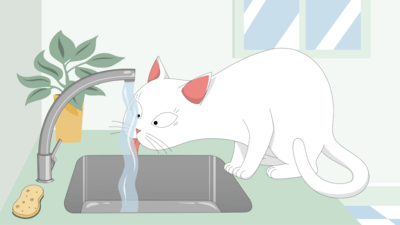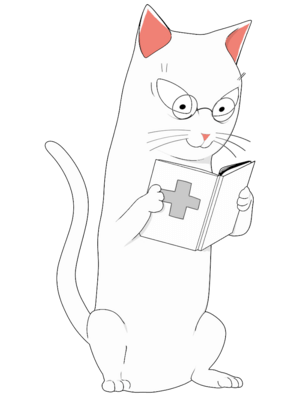
Treating chronic kidney
disease in cats
Chronic Kidney Disease (CKD) is one of the most common conditions to affect older cats. Clinical signs of CKD (also called renal failure or kidney failure) include lethargy, poor appetite, weight loss and increased thirst and urination.
Main therapeutic strategies to treat CKD
CKD is usually both irreversible and progressive. Unless a specific underlying treatable cause is identified (such as a bacterial infection of the kidneys), the main strategy is to support kidney function, reduce any further kidney damage and so slow the progression of disease, and to treat any complications.
Managing CKD usually requires regular assessments of blood pressure, repeat blood tests, and analysis of urine samples so that the consequences and complications of CKD can be detected early, and treated immediately.
Types of treatment for feline chronic kidney disease
Treatment of CKD is based on supporting kidney function, reducing progression of disease and managing complications. This usually includes a change of diet, ensuring good water intake and the use of certain medications:
- The use of a special therapeutic (or prescritpion) kidney diet is very important. These diets have a low phosphate content which help to protect the kidneys from further damage, a reduced protein concentration which helps reduced the build up of toxins, and a number of other modifications to support the kidneys. Dietary change can have a major impact on quality of life and progression of disease.
- Increasing water intake and preventing dehydration is important because in CKD cats cannot concentrate their urine properly. Feeding a wet (canned or sachet) diet helps with water intake, but encouraging further intake may be desirable by offering multiple water sources around the house and perhaps flavoured water - your vet will be able to advise on the best approach.
- In advanced disease, some cats will tolerate fluid being given under the skin by injection, or having regular intravenous fluid administered by a drip.
- Other medications will be suggested by your vet as the need arises, to combat specific complications.
Medications
CKD often results in a wide variety of complications, especially as the disease progresses. These include things like electrolyte imbalances, high blood pressure, anaemia, nausea and vomiting, increased protein loss through the kidneys (or proteinuria) and loss of appetite.
While no specific medication is indicated for all cats with CKD, there are many drugs that may be indicated when specific complications arise, these include:
- Phosphate binders – these are added to the food to help keep blood phosphate levels low and protect the kidneys when a diet change alone is not sufficient.
- Potassium supplements – low blood potassium can be a problem with CKD and can cause weakness, poor appetite and further kidney damage. This can be corrected with specific supplements.
- Anti-hypertensive (blood pressure) tablets – cats with CKD are at high risk of developing hypertension, which can cause damage to many organs, including the kidneys. If hypertensive is present, a drug such as amlodipine can be given once daily to control blood pressure and the risks of damage.
- Anti-proteinuric drugs - in CKD cats that are losing too much protein through their kidneys, drugs such as ACE-inhibitors or telmisartan can help to reduce the protein loss and may help reduce further kidney damage. These drugs may also help to reduce blood pressure.
- Anaemia – particularly in more advanced cases, anaemia can be a problem with CKD. Various treatments including iron supplements or the use of hormones (erythropoietin to stimulate the bone marrow to produce more red blood cells) may help.
- Anti-emetics (drugs to stop nausea and vomiting) – nausea is common in cats with CKD, and the use of appropriate medications can much improve quality of life, and also appetite.
As the disease progresses, your cat is likely to show signs of more advanced disease, such as not wanting to eat, vomiting, lethargy and weakness. These are the result of the complex imbalances that occur with CKD and can lead to additional complications such as dehydration and anaemia. More frequent monitoring and more intensive therapy may be needed in more advanced cases and sometimes (especially when cats become markedly dehydrated) a period of hospitalisation may be needed for appropriate treatment and stabilisation.

